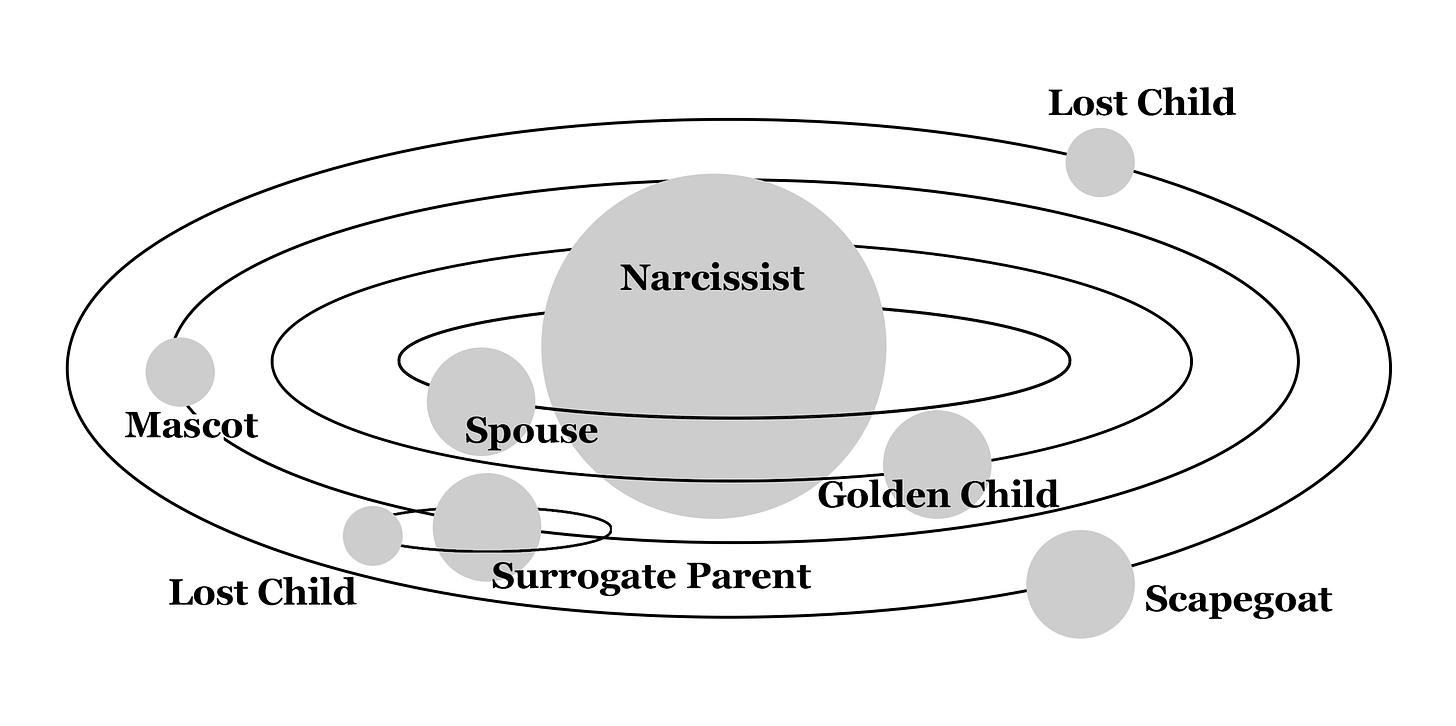Uniqueness, spontaneity and agency hold no value in a narcissistic family. Instead, everyone is reduced solely to a role that serves the narcissistic parent’s grandiose false self.
The spouse acts as a central pillar to legitimise the narcissist’s grandiosity. The spouse also stands in as an emotional sponge which protects the narcissist from having to be vulnerable with the children. The spouse generally puts out fires and plays the peacekeeper in the home.
The golden child becomes an expression of the ‘light’ side of the narcissist’s grandiosity. They are the narcissist’s protégé; the one who the narcissist pins their hopes and dreams on.
As for the ‘dark’ side of the narcissist’s grandiosity, frustration and negative emotions need to be syphoned off to maintain the integrity of the false self. After all, a ‘superior’ and ‘special’ person cannot have flaws. For this, the scapegoat of the family acts as an outlet. The narcissist shames the scapegoat, humiliates them, rages at them and blames them for everything that goes wrong. Where the golden child can do no wrong, the scapegoat can do no right.
Finally, the divine child is the narcissist’s mascot, playing a ceremonial role to give the family a positive brand in public.
The only person who lacks a defined role, is the lost child. Their sole task is to keep quiet, and never rock the boat.
Access Denied
The lost child is usually a middle sibling, or in some cases, can be the youngest. Once the narcissist has separated two of the children into ‘perfect’ and ‘disgusting’, i.e., into ‘good’ and ‘bad’, then they stop caring about the rest.
This is the simplest way to look at it. There are exceptions, of course.
Some families have two narcissistic parents, and the children can be split into two camps, depending on birth order and gender. The divine child can also be an exception. Much like the golden child, the divine child can do no wrong. Yet what separates them is that, unlike the golden child, nothing is expected of the divine child. The golden child is supposed to live up to the narcissistic parent’s demands — to become competent, special and powerful according to their parent’s vision. The divine child, on the other hand, is ‘the baby’, and adored simply for being the baby. You can think of the golden child as the narcissist’s ideal version of themselves, and the divine child as the child the parent could have ideally been before their narcissistic wound emerged. Both are projections.
In some narcissistic families, a child is designated as a surrogate parent and told to look after their younger siblings. In this case, the surrogate parent is given a position of importance that has nothing to do with the narcissist’s grandiosity. They simply play a functional role which frees the narcissist from the pressures of their parenting role.
Any child who fails to claim a position during the ‘scramble’ for roles gets left behind. While they are unlikely to be tossed out onto the street, they subliminally come to understand that there is a VIP section in their family, and they are not on the list.
The narcissistic parent then goes about maintaining their ‘realm’ of grandiosity, shining the light (and darkness) of their attention on the children in the ‘club’. Meanwhile, the lost child gradually comes to feel unseen. They might fight this reality for a time, using aggression to wrestle some attention, but the narcissistic parent is quick to put them back into place. Over time, the thick, heavy, corrosive fog of shame washes over the lost child, as they sink deeper and deeper into a haze of obscurity.
The Vertigo Of No Identity
In the family home, nobody enquires into how the lost child is feeling. Nobody asks them questions, or pauses to share a genuine moment with them. Family discussions involve the lost child sitting there like a mute. If the lost child does pipe up, they might get a blank stare before the conversation continues without them, or someone interrupts them halfway. Nothing the lost child shares is taken seriously. If the lost child is depressed, or upset, or struggling with something, nobody notices or cares.
Meanwhile, the lost child lives with a burning sense of unworthiness. They feel as though nobody sees them, hears them or cares about them. Without a mirror from others to give them feedback, acknowledgement, approval or guidance, the lost child loses a sense of who they are. Their only companion in their lonely world is shame; that burning sense of inferiority and worthlessness. A dark heaviness takes hold of them, as they find themselves sucked deeper and deeper into an internal abyss, feeling as though they are floating in infinite space.
The lost child eventually develops a ‘schizoid’ personality and grows detached from the world, experiencing it through a psychological glass window. Nothing feels real in this state; not even the lost child themselves.
Plagued by despair while aching from the pain of not belonging or even existing, the lost child continues drifting through the dark abyss, before noticing a light in the distance.
Awaiting them is Utopia.
A New World Of Possibility
The lost child’s alienation from their family often carries into the real world. Lacking foundational interpersonal skills, they struggle to find a spot in social circles at school and in the community. They spend the majority of their time alone, feeling lonely even when surrounded by people. They may develop one-on-one special relationships with other lost children, and this might eventually grow into a friendship group of ‘outcasts’. Yet the lost child’s internal state remains intact: They feel like an alien in outer space.
Without a world to connect with, and with shame swelling inside them, the lost child retreats from their pain and into their mind. They typically develop a rich imagination, conjuring up countless pretend scenarios where people love them or they can be the hero. This helps medicate their feeling of being unlovable and impotent in the real world.
The lost child also develops a long series of crushes, picking out special love interests who might ‘choose’ them and pluck them out of obscurity. These crushes usually remain in the lost child’s imagination, however, with the lost child staring and longing from afar.
In their spare time, the lost child may spend countless hours reading, binge-watching or playing video games. This dissociated state acts to numb the lost child’s pain while giving them a sense of peace and control.
The lost child will often dabble in creative pursuits. They do this intuitively as a way to give shape to the unspeakable reality that is their life. After all, how can you voice something which does not exist?
Being an outsider for much of their life, the lost child gains a one-of-a-kind bird’s-eye view of the world. While others are wrapped up in the minutiae and triviality of daily action, the lost child sees only the bigger picture. Unaffected by the bluster and drama, and undistracted by social demands, the lost child has nothing but time and space. They spend it observing the world, as patterns and insights gather in their rich imagination, and they begin to connect dots nobody else sees.
An Indispensable Perspective
The world is a chaotic and confusing place. Unceasing events in our lives and society at large create ripples and waves of overwhelming emotions and problems. Someone in the house leaves their dental floss on the sink every damn day, and you are ready to burst. Two of your close friends are no longer on speaking terms, and you find yourself playing diplomat while losing sleep over the drama. Your lover has been acting strange and distant recently. Long hours at work are making it harder to honour your commitment to your basketball teammates. Such are the demands of living in an inter-connected world. You have no time to process, let alone make sense of your life.
Enter the lost child.
The lost child barely notices the mess on the sink, too lost in their imagination. They coolly observe their school or work drama from their lonely spot and wonder if it matches that psychology book they spent all weekend reading. An acquaintance of theirs, overwhelmed and over-stressed, soon notices the lost child doing nothing and confides in them about their relationship problems. The lost child consults their rich imagination and deep knowledge, and suggests something the acquaintance had never thought to consider. Half-impressed and half-sceptical, the acquaintance thanks the lost child and goes about their day, wondering how they will implement this enlightened bit of advice.
Herein lies the paradox of the lost child. From their dispensable and disposable place, they become uniquely indispensable. With their creative way of thinking, encyclopedic knowledge and bird’s-eye perspective, the lost child can offer immense value. In many cases, this value is squandered, as the lost child, riddled with low self-esteem and a lack of agency, remains in their place of obscurity.
For the fortunate lost child, the world comes calling. In such a case, someonenotices the lost child’s exceptional worth and encourages them to share it. Lost children are often famed painters, prolific writers and brilliant philosophers. They go from being cast out of the world to transcending it, while transforming society in unfathomable and unimaginable ways.
If you happen to be a lost child, know this: You are worthy. But only when you learn to see yourself. Rise to your Higher state, and direct your lost inner child to follow your light back into the world.
God knows it needs you.
Browse more of my articles:
Narcissistic Relationships | Knowing The Narcissist | Abuse Recovery | The Narcissistic Family| Exploring Narcissism | Borderline & Histrionic
Check out my Books on Narcissistic Abuse. You can also Buy Me A Coffee to support my writing.






"Uniqueness, spontaneity and agency hold no value in a narcissistic family. Instead, everyone is reduced solely to a role that serves the narcissistic parent’s grandiose false self."
Ain't that the truth. When I cut contact with my parents-in-law I told them having a relationship with them was like watering a fake plant. A. unkind thing to say, but summer dup my experience of them nicely.
"The spouse acts as a central pillar to legitimise the narcissist’s grandiosity. The spouse also stands in as an emotional sponge which protects the narcissist from having to be vulnerable with the children. The spouse generally puts out fires and plays the peacekeeper in the home."
Do you think it is possible for he spouse to take on some of the narcissistic parent's tendencies? Or perhaps the only people who can stay with a narcissist are equally emotionally immature and so they utilize the same dysfunctional skills sets for trying to get their needs met and maintain control.
I have never ready such an eloquent and thoughtful description of the lost child before today. Nor had I heard of the divine child. Thank you for sharing this JH! It makes so much sense.